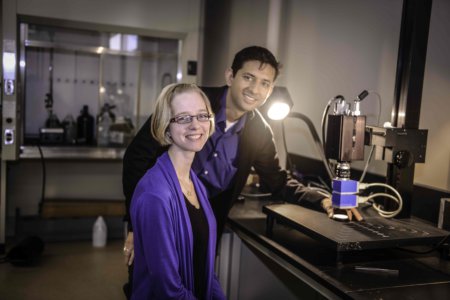The University of Manitoba‘s Department of Biosystems Engineering prepares aspiring engineers for career success. Students here gain a deep understanding of how to apply engineering principles to biological systems — something Joshua Ilyas from Karachi, Pakistan experienced first hand. For his Design of Assistive Technologies class this fall, he got to be part of a wheelchair device design project. Last semester, he designed a gearbox which would slow the speed of a given motor to accommodate a ventilator.
Ilyas initially joined the Electrical programme for a year before switching to Biosystems Engineering in the Fall of 2021. “The switch to Biosystems Engineering has been one of the best decisions I have made during my academic career,” he says. “I have enjoyed my classes and found my professors exciting and knowledgeable. This year has been instrumental in making me feel exceptionally prepared to pursue a future career in biomedicine.”
Here, students gain a master’s degree that prepares them to be a leader in their chosen industry. Forbes reports that individuals with graduate degrees earn approximately 20% more than their counterparts without such qualifications. The benefits extend beyond financial gains too, encompassing increased career advancement opportunities, the development of valuable networking connections, heightened job security, and a competitive edge with specialised skill sets.
Student Karisma Vyas foresees she’ll stand out from others in the industry with a more unique outlook. “For example, a mechanical engineer may be designing a piece of assistive technology, but they won’t understand how the human body is going to interact with the body in the way that a biosystems engineer might,” she says. PhD candidate Ellery Burton believes he’ll become better at solving problems that require advanced technology or knowledge. “I feel that a PhD will round out my industry knowledge with top-level education that will lend credibility to the work that I hope to accomplish,” he says.
Student Izabella (Izzy) Marquez feels “extremely prepared” to get into medical school now that she has “a very strong understanding of science, math and physics.” “Engineering’s out-of-the-box thinking has equipped me with a versatile mindset, enabling me to approach complex issues from different angles,” she says. “This adaptability will undoubtedly serve me well in the dynamic field of healthcare whether that be as an engineer or wherever my future takes me.”
The department offers graduate degrees in Biosystems Engineering — Master of Engineering in Biosystems Engineering (MEng), Master of Science in Biosystems Engineering (MSc), and PhD in Biosystems Engineering — that empower students to achieve these goals. They are great choices for anyone passionate about addressing challenges in sustainability and global food security which require expertise in engineering principles and biological systems as well. In fact, the department is the only one of its kind offering Biosystems Engineering (or similar) programmes in Western Canada.

The Master of Engineering degree is ideal for industry-experienced engineers seeking to enhance their knowledge or specialise in this niche field. Source: University of Manitoba
The MEng programme offers a tailored approach to advanced education, accommodating the needs of engineers seeking expertise in engineering practice with a focus on biological systems. It boasts flexibility in course selection, allowing students to balance technical and professional-skill engineering courses. Course offerings include Bioprocessing, Numerical Modelling of Biosystems, Food Process Engineering, Bioresource Engineering and Sustainability, among others. This 30-credit programme can be completed in as little as eight months.
Experiential learning is paramount in this programme. There are site visits, guest speakers, workshops, and seminars. Students also find ample opportunities for involvement in student groups, teams, and leadership roles. In a new co-op program to be introduced in the coming year, MEng students will have opportunity to gain practical engineering experience and earn a salary.
“In all the courses I’ve taken, instructors consistently incorporate real-world examples into every topic instead of merely explaining concepts without practical illustrations,” says MEng student Patrick Seale. “There are also some classes where we have taken field trips to see these real-world examples to further our understanding, like visiting a farm and its irrigation system or touring an e-waste recycling facility.”

Biosystems engineering applies engineering principles to plants, animals, humans, and microorganisms. Source: University of Manitoba
Another graduate student, Aduragbemi Ajagbe, agrees. He chose courses that involved agricultural machinery and technology to understand how agricultural practices have evolved and the modern practice of farming in Canada. Last summer, he was involved in a research project on fibre extraction from canola stalks with professors and a few classmates.
“It was a very hands-on project that helped improve my technical skills like report writing, project management, machine design, fabrication, and soft skills like communication and interpersonal relationships,” says Ajagbe. “It was a very invaluable experience for me.”
Learning on campus is just as impactful. Classes are small, making it easy to ask questions and form relationships with faculty and peers. This community-minded approach ensures that students receive optimal support throughout their time here.
“I had a positive experience with all educators, especially Dr. Danny Mann, who employed creative teaching methods and impactful assignments that ensured the information acquired in class lingered in students’ minds,” Ajagbe says. “Writing reflection summaries enhanced my learning perspective, and Dr. Joe Ackermann’s research-intensive assignments on sustainability provided valuable insights applicable across other courses.”
The deadline to apply for the Fall Term (starting in September) is January 15. To be eligible for the MEng in Biosystems Engineering, applicants typically need a bachelor’s degree in engineering, regardless of the discipline.
To begin your online application process, click here. To learn more about the Department of Biosystems Engineering at the University of Manitoba, click here.
Follow University of Manitoba on Facebook, X, Instagram, YouTube, and LinkedIn











